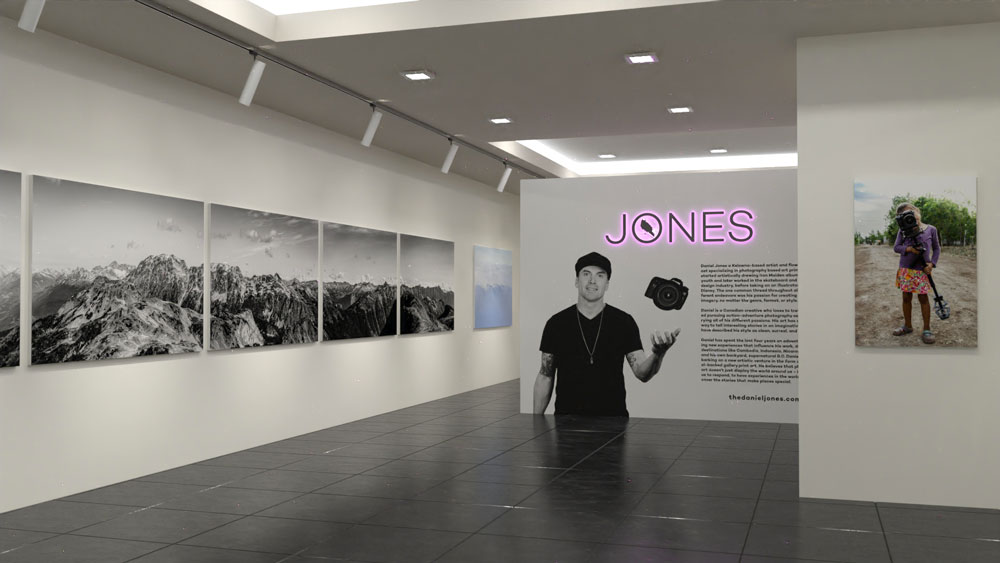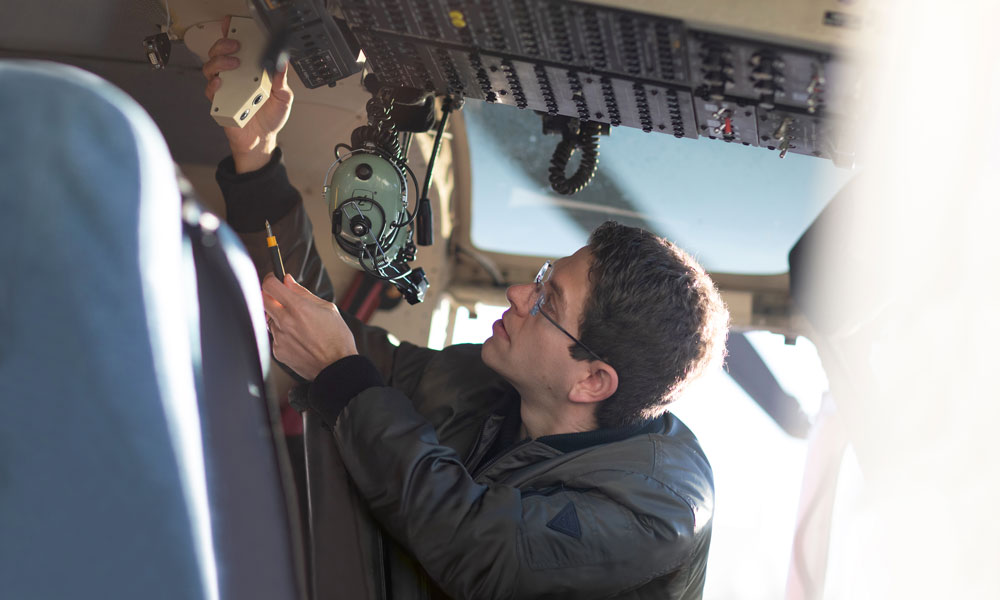
THERE’S A NEW GEAR IN UBCO’S INNOVATION ENGINE that’s helping to incubate, accelerate and facilitate new entrepreneurial ventures.
Located in Kelowna, BC, entrepreneurship@UBCO (e@UBCO) provides resources for eager participants with creative skills and an entrepreneurial drive. Whether it’s scoping out an idea or helping to build a new company, e@UBCO is tailored to each individual.
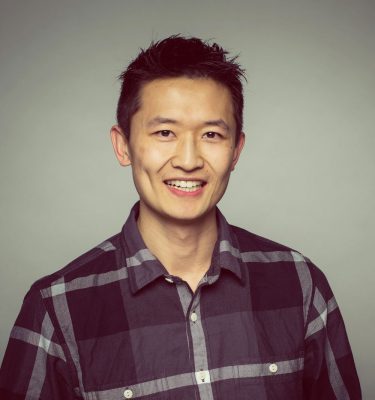
Kenneth Chau
“e@UBCO should really be called ‘how to achieve impact’,” says UBCO Associate Professor Kenneth Chau, who also co-founded two e@UBCO ventures: Happipad and BanditVR.
“Participants learn first-hand how to test their startup ideas, build connections within the innovation ecosystem and develop the skill set needed to launch a successful new venture.
“These ventures are the entrepreneurs’ babies and they’re invested in their well-being. e@UBCO guides them through this process.”
In addition to his own e@UBCO ventures, Chau is helping to evolve new approaches as an advisor to the program. While other universities offer business mentoring programs, Chau believes UBC has developed something special.
“Through e@UBCO, UBC has shown leadership by providing a direct path for students to gain entrepreneurial knowledge at the undergraduate, graduate and alumni levels,” he says. “This is the next level of learning.”
Through a series of online courses and one-on-one mentoring with industry experts, e@UBCO participants get access to the ins-and-outs of developing a venture. The curriculum follows the pace of the participant’s venture, covering topics ranging from customer discovery, intellectual property and prototyping to business plans, go-to-market strategies, sales and fundraising. The program is open to UBCO students, faculty, staff and recent graduates in any discipline.
Since its inception in 2018, e@UBCO has mentored more than 1,000 participants and more than 50 ‘campus grown’ businesses have been launched. It’s an excellent success rate, according to e@UBCO’s managing director, Camille Saltman.
“It’s a testament that ‘research translation’ is more than a buzz phrase. Here, researchers and collaborators evolve the business and marketing skills to become entrepreneurs.”
She adds that the program is tailor-made to fill the participants’ knowledge gaps in addition to teaching the fundamentals of starting a business.
Program highlights since 2018 LAUNCH
![]()
69 VENTURES COACHED
![]()
105 EMPLOYEES HIRED
![]()
$2.4M RAISED
The Sky’s the Limit
‘This has never been accomplished before’ seems to be Ephraim Nowak’s catchphrase, which he unassumingly uses while describing his projects.
The modest alumnus, who earned his Bachelor of Science and Master of Applied Science from UBCO, admits that he’s always had a passion for all things robotic — especially technologies that can extend human capabilities deep underwater or high in the sky.
“I’ve always loved working with electronics and drones,” says Nowak, recalling how he and his brother Raphael, also a UBCO alumnus, built remotely-operated underwater vehicles to scour the depths of Okanagan Lake when they were teens. But their treasure was no shiny bounty; rather, they were searching for previously undocumented science and history.
The Nowak brothers’ underwater curiosity ultimately resulted in a partnership with the Central Okanagan Search and Rescue (COSAR) team. The duo built a deep-lake drone with a camera that could explore the 232-metre depths of Okanagan Lake, assisting the COSAR team with underwater search efforts.
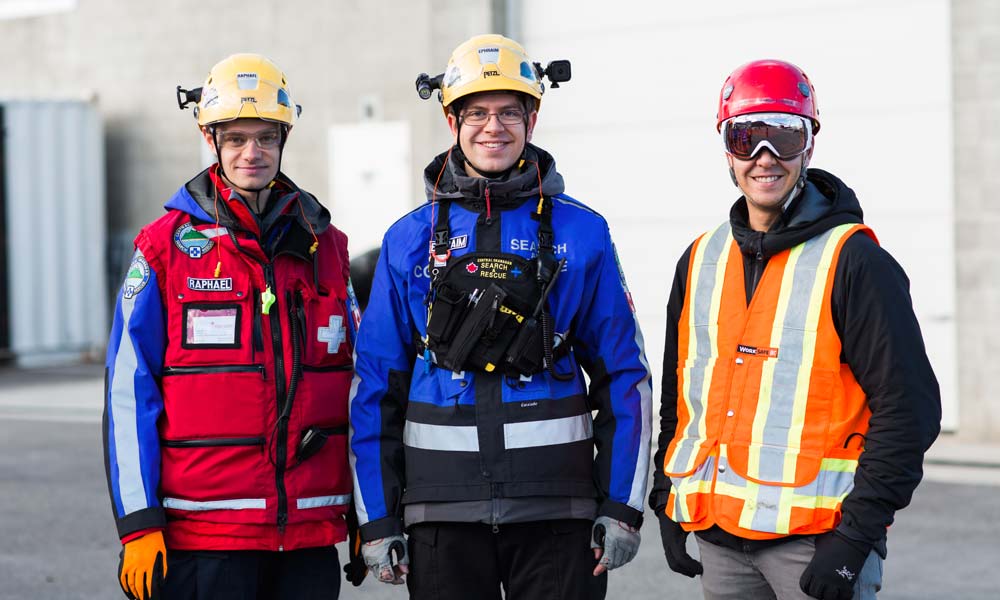
Raphael (left) and Ephraim (centre) in their search and rescue gear.
As Nowak segued from his bachelor’s degree in computer science to his master’s degree in electrical engineering, his interests navigated from the sea to the sky. Similar to the watery scenario, he developed a drone-assisted system to see where others could not — namely, the smoke-clogged skies produced by wildfires. On average, BC sees 1,756 wildfires every year, impacting thousands of hectares of land. A number of large fires in the Okanagan have drastically impacted local communities, destroying homes and temporarily displacing thousands of people.
This system — Nowak’s second coup — provided an accurate view of the extent and activity of fires below in real time.
With his entrepreneurial drive revved, Nowak connected with e@UBCO and was soon paired with business mentors. “It was perfect timing and a great fit,” he says. “I had access to legal, accounting and business development advice.”
He also learned about customer relations and the importance of having client input at the outset of a project rather than first trying to sell a definite solution.
“Gathering customer intel for a product is key to success,” says Nowak, who also leveraged the network of the e@UBCO members. “They helped me connect with the largest aerial mapping company in the United States, which is notoriously difficult to reach.”
Nowak adds that he was also given many useful opportunities to meet other leaders in the field. It was these connections and sense of accountability of the e@UBCO program that led Nowak to his next endeavour — starting his own business, Percept Systems.

An example of the visuals captured by SkyVU.
With input from potential customers, the Percept team developed a first-of-its-kind lightweight cockpit video recorder called SkyVU. The custom computer vision system is mounted behind the pilot, capturing and digitizing aircraft gauge readouts as well as pilot audio and the view outside the aircraft. After a flight is completed, the recorded footage is downloaded and analyzed using software developed by Percept Systems.
Typically, small aircraft including helicopters don’t have flight recorders, also known as black boxes. This bothered Nowak, who came up with the idea for SkyVU as a search-and-rescue volunteer after visiting the site of the plane crash that killed former Alberta premier Jim Prentice in 2016.
“When that investigation report came back inconclusive because there was no data recorder on board, it opened my eyes to the possibility that I could apply my skills to make a difference.”
Unlike other cockpit recorders that require a connection to the gauges themselves to obtain numeric values, SkyVU operates on video only, making it simple, inexpensive and easy to install. The recorded footage provides information that can be used for training and maintenance review.
Nowak’s desire to give back continues today, as does his entrepreneurial drive. He recently stepped up again, responding to the Canadian Government’s public plea for assistance in medical supply manufacturing during the COVID-19 pandemic.
Learn more about
He saw an opportunity to pivot his company’s focus and add to its offerings — key to the success of any start-up business. With his team’s support, along with input from his former research supervisor, Homayoun Najjaran, associate director of the manufacturing engineering program at UBCO, Percept Systems is now producing more than 5,000 face shields daily.
“We were aware of the shortage of these critical medical supplies and wanted to help out where we could,” Nowak says. “This was the right thing to do.”
He credits his experience and support from the e@UBCO community for having a forward-thinking approach and the confidence needed to change his business focus.
“Being flexible and adapting is just good business.”
A Place to Call Home
Welcome to Happipad, an online service that matches compatible people as housing companions.
“Think of it as a blend of AirBnB and Match.com,” explains UBCO alumnus and Happipad co-founder and CEO Cailan Libby.
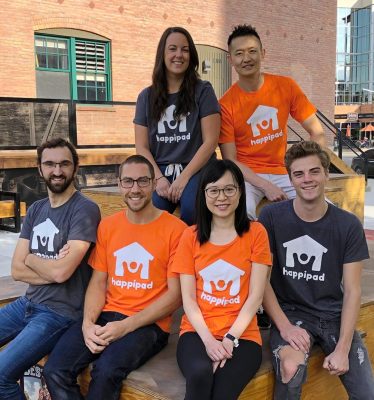
Cailan Libby (bottom row, second from left) and members of the Happipad team.
Back in 2015, when Libby worked as a summer researcher in Chau’s lab, both men were motivated by a mutual drive to address large-scale issues. However, they agreed to first tackle a local challenge: the low vacancy rate for rental properties in Kelowna, BC.
“At one point, Kelowna had one of the lowest vacancy rates in Canada,” says Libby, who was personally searching for an apartment at the time. “I like solving difficult problems and was motivated to find a solution.”
Rather than turning to the traditional solution of building new spaces, Libby and Chau explored the unconventional approach of how to better use existing homes.
“Did you know that about 30 per cent of existing real estate is unoccupied?” asks Libby. This statistic initially surprised him, and when he dug further he discovered that many houses in Kelowna had vacant bedrooms, mostly emptied by grown-up children. He and Chau landed on the proposal of matching empty-nesters with individuals looking for accommodation.
It was a good idea, but the next steps were unclear, so Libby turned to e@UBCO.
“Initially, I was trying to do everything myself and was burnt out,” Libby explains. He was relieved to have the input and support from his e@UBCO mentors and happily acknowledges that the program’s direction and clear milestones helped move his project forward — providing a huge sense of achievement.
“It was hard to stay motivated on my own. I thrived with the accountability and feedback.”
Similar to Nowak, Libby was surprised by his misunderstanding of the market. “You can build the best solution, but if it’s not what the consumer wants, it doesn’t matter.”
After much research and consultation, he and Chau launched Happipad.
One of the main barriers they faced was trust: “People have a hard time opening their homes to strangers,” explains Libby. “Happipad’s role is to build confidence in individuals who have extra space, and make them comfortable listing their homes and inviting someone in.”
“There’s nothing quite as challenging as entrepreneurship, but nothing as rewarding either.”
For him, Happipad is about more than just a rental transaction; rather, it provides an opportunity for connection through housing companionship.
So far, Libby’s idea is working. More than 115 housing companion matches have been made, with satisfied parties on both sides and virtually no conflict. In addition, 5,000 home-seekers and 600 hosts have registered across BC and Alberta.
And Happipad is scaling-up. Libby happily reports that the company is moving towards a model that allows community organizations to run their own regional companion housing programs powered by the Happipad framework. The first of these programs was initialized in the city of Revelstoke, and six more are slated to start this year in BC and Alberta.
“This model enhances the community impact of Happipad,” says Libby. “It will allow each partner organization to run their own regional companion housing program, which will be self-sustaining. So far, 12 community partners are collaborating with the team on the development and distribution of this program.
“I’m pretty happy with our success,” adds Libby, who notes that the business continues to evolve through the COVID-19 pandemic.
He suggests that the Happipad companion housing program may be an ideal solution to help vulnerable adults.
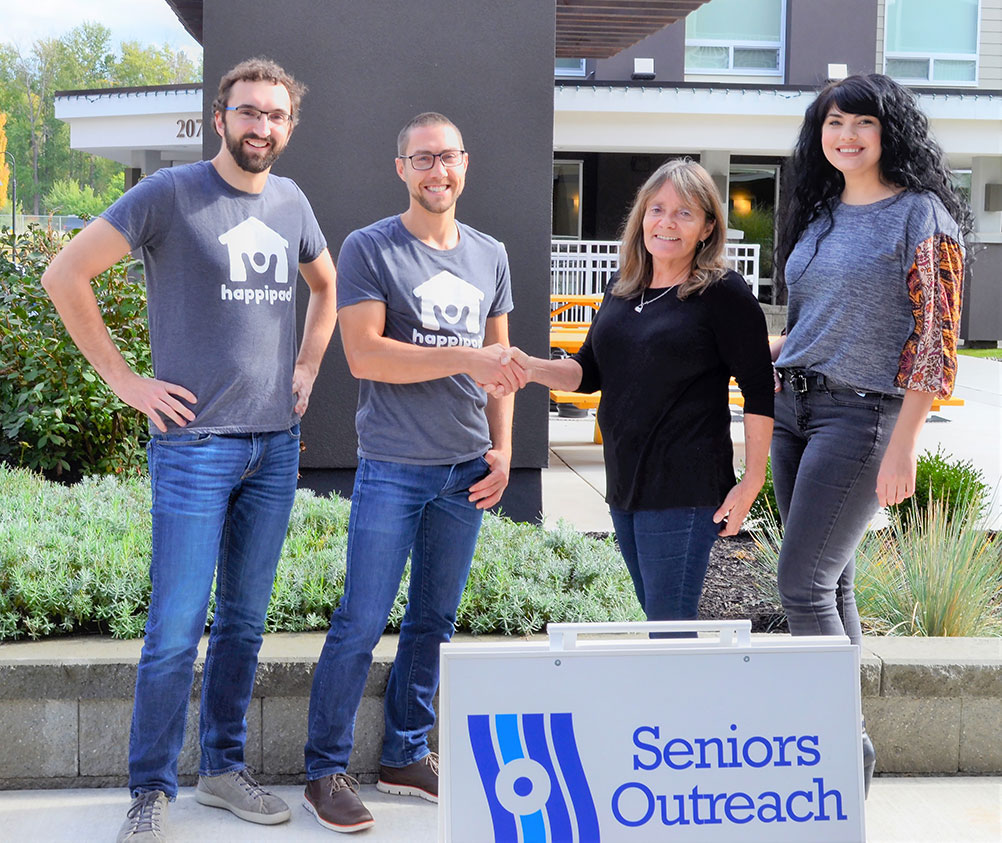
“Housing companions can help each other with shopping, limiting exposure risk, while also providing social companionship to address the mental health challenges related to isolation,” he says.
Libby adds that Happipad has received encouragement from seniors’ organizations, many of which have seen an increased need for solutions to help address the challenges seniors face being isolated at home.
“Ideally, we want homes to feel less like a ‘landlord versus tenant’ battle and instead be mutually beneficial, inclusive and welcoming. We’re hopeful that companion-style housing will become a mainstream option so that seniors don’t have to move into institutional senior housing.”
Libby says he would like to see seniors live within the community and in the home of their choice, among supportive people who promote a healthy and happy lifestyle. Exploring problems like these in new ways is at the heart of innovation, and Libby relishes in examining challenges to find solutions and new opportunities.
“There’s nothing quite as challenging as entrepreneurship, but nothing as rewarding either.”
Virtual Spaces in the Making
Vincent Loi has the skill of being able to imagine what the infinitesimally small — or nano — might look like. His doctoral research at UBCO, under Chau’s supervision, explores the potential application of materials engineered on nanometer scales through immersive visualization.
Using complex computing and virtual reality (VR), Loi is able to visualize the possibilities. Word of his unique VR abilities quickly spread and came to the attention of local businesses, who saw potential in this technology for immersive, virtual spaces.
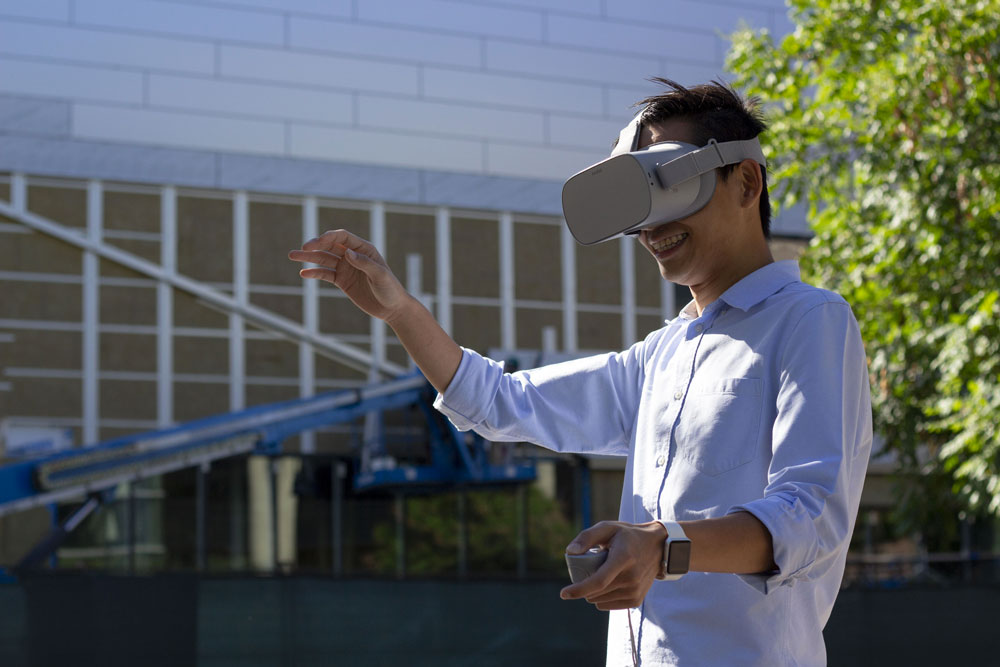
Vincent Loi demonstrating virtual reality goggles.
Chau and Loi decided to start a VR company and turned to e@UBCO for advice and mentoring. The result was BanditVR, which aims to model real-life appearances of materials, textures, surfaces and structures.
“When innovating, you need to think outside the box and to uncover the needs of today’s market. Research should be driven by the search for ideas, technologies and processes that have potential impact,” explains Chau.
In their first effort, they created a virtual showroom for a boat manufacturer, which Loi acknowledges is easier than moving and hosting such large physical stock.
BanditVR’s business model was working well, and the company further realized new opportunities during the COVID-19 pandemic, as many retailers sought new virtual experiences.
Thanks to the innovative thinking of Valhalla Angels Kelowna chapter President Grant Lawrence, a resident e@UBCO mentor, Loi and Chau were introduced to weshowup.io, a Vancouver-based event ticketing platform that was seeking new ways for artists to perform online during the pandemic. Together, these two start-ups collaborated to produce a virtual experience for artists and galleries to display their works.
“This experience showcases the importance of having programs like e@UBCO backing us,” adds Chau. “Without this input, the opportunity to connect may not have been there. Mentorship is valuable because the mentors have vast experience and see connections where new start-ups may not. Also, the e@UBCO program helps new ventures stay on track with their strategy.”
Loi thinks that their latest virtual experience will open up opportunities during periods of physical distancing, which may continue for the foreseeable future. “Our aim is to find new ways to businesses and organizations to connect with their audiences safely. Our recent development work has opened up possibilities for virtual experiences where you can chat with others, view videos and make online purchases,” he says. “I’m excited to be at the forefront of this.”
This was just the beginning of BanditVR and Weshowup’s partnership; in fact, the companies recently merged. Their hope is to offer unique online events such as concerts or speaker forums, and build virtual online shopping experiences that are immersive, memorable and can be enjoyed from the comfort of home.
Loi is energized by this progress and encourages budding entrepreneurs with venture ideas to “jump-in.”
“Don’t wait. The world has changed and now, more than ever before, new entrepreneurial opportunities are at our doorstep.”
“Don’t wait,” he says. “The world has changed and now, more than ever before, new entrepreneurial opportunities are at our doorstep.”
Chau agrees and anticipates that entrepreneurial courses will become standard at universities. “Students are curious,” he says. “Although this process isn’t easy, there are many learning moments, some of which wouldn’t pop-up naturally in a classroom. These are valuable experiences that will allow our students to become uniquely equipped to contribute to society.”
